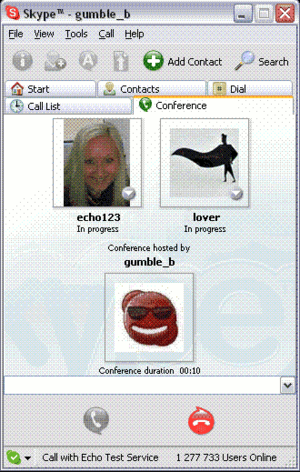VOIP
- Voice Over Internet Protocol
- is a method of digitising your voice, sending it over the Internet, and turning it into sound at the other end.
You don't need dedicated telephone lines, just an Internet connection, and a computer with a sound card and a head set (or microphone plus speakers). It costs the same to talk to Melbourne or Maynooth.
We used Skype VOIP between Belfast, Maynooth and Letterkenny to plan our research. We have even used it between Vermont and our workshop in Armagh, to hear Lars Hasselblad Torres talk about the work of AmericaSpeaks and their 21st Century City Meetings.
The screen shots of 3 VOIP clients show the lists of friends who are online at the moment. Click on their name to place a call over the Internet. You can also set up conference calls to 5 or 6 people at once.
How would you use them in a consultation? There is not enough bandwidth, even in a broadband connection, to support dozens of people sending audio. There are two circumstances where they might help.
- A telephone conference between key stakeholders, who cannot make it to a face-to-face meeting at the same time.
- Connecting several local meeting rooms. Each room has a computer, radio microphone and speakers. Members of the public can take turns to hold the microphone, ask questions of experts, or present their views.
The second setting worked in Hilltown, at the foot of the Mourne mountains. People at the Green Party AGM in 2005 used a radio mike to ask questions to a Euro MP sitting in her office in Brussels. Her replies came loud and clear, via MSN Messenger and broadband Internet, over the speakers in the room. As she didn't have to fly, she didn't speed up global warming on that day.
Many VOIP clients can be downloaded. Most of them offer free calls between computers, but charge you for connections to conventional telephones. Here are a few of them, in alphabetical order:
|


